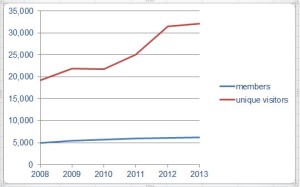Blogging skills
I found a post about developing your skills at blogging which I thought worth mentioning. It is also relevant on the whole for newsletter writing.
It doesn’t mention ‘be yourself’ directly, but I think that is the only major point I would add to the list.
In summary, Chris Garrett gives 10 points that lead to successful blogging:
- blog by example
- blog with passion
- be organised (well, I can’t always get 10 out of 10!)
- delegate
- take ownership & responsibility
- communicate effectively (hopefully, that’s where my tips come in handy!)
- be brave & honest
- listen
- know your readers
- be a reader
I found number 7 interesting – I am always honest in my blog but don’t feel I am particularly brave as communications isn’t usually very controversial 🙂 But then I read Chris’ comments about this to find him saying pretty much the same thing and suggesting there is bravery in choosing and presenting topics.
Which of the above points do you find most challenging in your blog writing?




Recent Comments